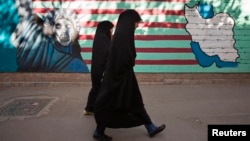An outspoken Tehran University academician said anti-American ideology under the slogan "Death to America" is at a dead end in Iran.
Political science professor Sadeq Zibakalam said in an exclusive interview with VOA that because of changes that have occurred in Iran in recent years, “we are observing the sunset of ‘Death to America.’
“ 'Death to America' is definitely in decline,” he said. “I believe that the Vienna agreement" — the nuclear agreement Iran struck with the United States and other world powers — "virtually might be referred to in the Iranian Islamic history as a turning point, which marks … the beginning of the end of the anti-Americanism.”
The most educated Iranians, the professor said, were “eager to see the nuclear agreement to go through.” He said “that was another way of saying that we are tired of anti-Americanism, and we are no longer supporting calling and shouting ‘Death to America.’ ”
Broader cooperation
Students, writers, intellectuals, artists and professionals in Iran “no longer support ‘Death to America’ and anti-Americanism euphoria,” which they did perhaps up until 15 years ago, Zibakalam said. He said that less than 10 percent of today's Iranian students believe "strongly and genuinely in chanting ‘Death to America.' "
He believes, as do many analysts outside Iran, that the nuclear deal struck this week might bring a broader cooperation between Washington and Tehran in the fight against Islamic State extremists and on other international issues, such as Afghanistan, Iraq and Syria.
There are strategic common interests, Zibakalam maintained, between the United States and Iran, and that is why “Death to America” is in decline.
Zibakalam said the "Death to America" phrase will continue to be heard when hard-liners gather in religious ceremonies. He said they try to prove wrong those who do not subscribe anymore to that ideology, but it is nevertheless in decline. No one can expect an almost 40-year-old ideology “to evaporate overnight,” he said.
Supreme leader resolute
In Tehran on Saturday, Iran’s supreme leader, Ayatollah Ali Khamenei, said the nuclear deal would not change his country’s policy toward the United States. He said that Iran has no negotiations with the “arrogant” United States about other global, regional or bilateral issues.
A prominent Iranian analyst, Davoud Hermides, told The Associated Press that the ayatollah’s comments were aimed at Iranians and sought to pacify hard-liners “who are worried about rapprochement with Washington."
A conservative Iranian politician, Hamid Reza Taraqi, said Khamenei was trying to counter U.S. efforts to damage “Iran's anti-arrogance stance."
"Americans have tried to suggest that Iran has given up its anti-U.S. stance in order to tarnish Tehran's image in the eyes of its supporters,” Taraqi said, adding that Khamenei’s comments nullified that.
The ideology of anti-Americanism in Iran erupted nearly 35 years ago, seven months after the Islamic Revolution, when radical Iranian students seized the American Embassy in Tehran and ushered in a powerful wave of anti-Westernism.










